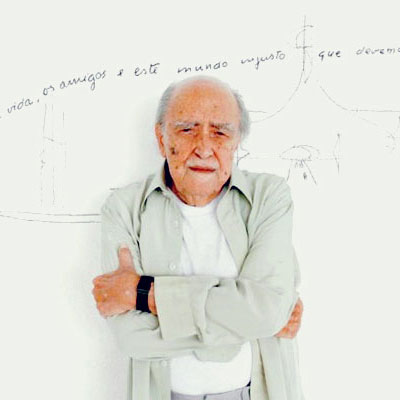"All forms that create beauty have a function." (Oscar Niemeyer)
 Yesterday on a flight to Calgary I read The Curves of Time: the memoirs of Oscar Niemeyer. First published in English in 2000, the book was recently re-released in December of 2007 to celebrate Niemeyer’s 100th birthday.
Yesterday on a flight to Calgary I read The Curves of Time: the memoirs of Oscar Niemeyer. First published in English in 2000, the book was recently re-released in December of 2007 to celebrate Niemeyer’s 100th birthday.I have admired Oscar Niemeyer’s work for quite some time. At 100 years old and still practicing in his native Brazil, he is the last surviving master of Modern architecture, and the tenacity of his spirit alone, not to mention his beautiful architecture, is enough for me to be able to count him among my architectural “heroes.”
I do not even fully understand myself why I love Niemeyer’s work so much. In many ways, it presents a strange paradox. I love it because it is unique yet contextual, massive yet light, rational yet sculptural, irrational yet beautifully engineered, simple yet complex, diagrammatic yet well-developed, messy yet clean, clunky yet gentle. I love it because it is completely Modern. I love it because it is uninhibited. I love it because it is fun.
And like his architecture, Niemeyer himself is somewhat of a paradox. He writes in the forward to the 2007 edition, “On re-reading this book, I feel that it uncovers two distinct personas. One looks on the bright side of life and sees the fun part of it that has always attracted me. The other has a pessimistic view of life and society in general, and is angered by the injustices of this world.”
Throughout his rambling prose, which is superficially about architecture but mostly about his incredibly rich and colorful life, Niemeyer’s most poignant writing is not about his architecture, but about his friends, his family, his travels, his hopes and fears for the world. His gentle words of sorrow are the ones that touched my heart the most. “There are elements of the past that I have never forgotten. Family, my beloved parents, friends who were so close . . . I cannot help crying, quietly, slowly, tenderly, with melancholy. I close my eyes and a strange serenity settles over me, as if I were off to meet them all again. . . . What bothers me is not life’s few rough edges, but the tremendous suffering of the destitute confronted with the indifferent smiles of the well-to-do.”
 I have had a long-time dream of meeting Oscar Niemeyer someday, not only because of my admiration for his work, but also because of the contribution he has made to architecture. Not only did he help to release Modernism from its restrained European roots, but his architectural legacy in Brazil will continue to live on long after he is no longer adding great buildings to its number. I know that meeting him now near the end of his extraordinary career and while I am still taking my own baby steps in architecture would be a once-in-a-lifetime experience. Niemeyer is the last representative of a great Modern tradition. I have no doubt that I will someday have the opportunity to travel to Brazil to see Niemeyer's work first-hand, but I understand with a bit of sadness that my chances of meeting this great architect in person dwindle with each passing year.
I have had a long-time dream of meeting Oscar Niemeyer someday, not only because of my admiration for his work, but also because of the contribution he has made to architecture. Not only did he help to release Modernism from its restrained European roots, but his architectural legacy in Brazil will continue to live on long after he is no longer adding great buildings to its number. I know that meeting him now near the end of his extraordinary career and while I am still taking my own baby steps in architecture would be a once-in-a-lifetime experience. Niemeyer is the last representative of a great Modern tradition. I have no doubt that I will someday have the opportunity to travel to Brazil to see Niemeyer's work first-hand, but I understand with a bit of sadness that my chances of meeting this great architect in person dwindle with each passing year.I was initially a little hesitant to read Niemeyer’s memoir because I did not want the truth of the man to cloud my admiration for his work. But after reading his beautifully willful and wandering story, I am even more moved with admiration for his sympathetic soul. I am drawn to the exuberant artist, the melancholy soul, the political dissident, the lover of mankind, the sympathizer with the oppressed, the creator of beauty.
"I have always argued for my favorite architecture: beautiful, light, varied, imaginative, and awe-inspiring." (Oscar Niemeyer)
No comments:
Post a Comment